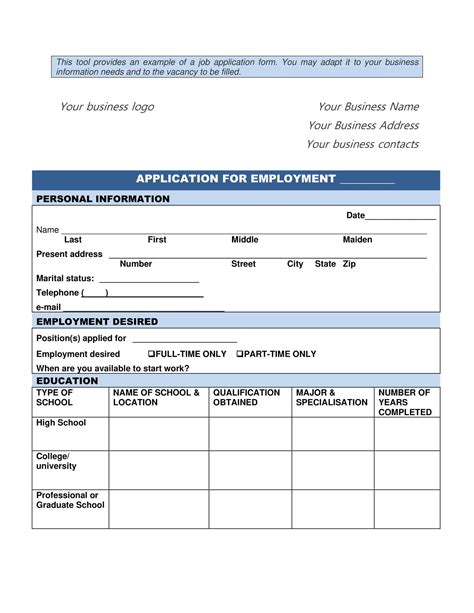Lying about one's racial identity on a job application can have serious consequences, both for the individual and the organization. In recent years, there have been several high-profile cases of individuals being caught falsifying their racial identity, resulting in public embarrassment, job loss, and even lawsuits.
Despite the risks, some individuals may still feel tempted to misrepresent their racial identity in order to gain an advantage in the hiring process. However, it is essential to understand the potential consequences of such actions.

Loss of Job and Reputation
One of the most significant consequences of lying about one's racial identity on a job application is the loss of job and reputation. If an individual is caught falsifying their racial identity, they may be terminated from their position and their professional reputation may be damaged. This can make it difficult for the individual to find new employment in the future.
Lawsuits and Financial Consequences
In addition to job loss and reputational damage, individuals who lie about their racial identity on a job application may also face lawsuits and financial consequences. For example, if an individual falsely claims to be a member of a protected class in order to gain an advantage in the hiring process, they may be sued by the employer for damages.
Criminal Charges
In some cases, lying about one's racial identity on a job application can even result in criminal charges. For example, if an individual falsely claims to be a member of a protected class in order to gain an advantage in the hiring process, they may be charged with fraud or perjury.
Damage to Employer's Reputation
Lying about one's racial identity on a job application can also damage the employer's reputation. If an employer is found to have hired an individual who falsified their racial identity, it can damage the employer's reputation and credibility.
Undermining Diversity and Inclusion Efforts
Finally, lying about one's racial identity on a job application can undermine diversity and inclusion efforts. If individuals are able to falsify their racial identity and gain an advantage in the hiring process, it can create a perception that diversity and inclusion initiatives are not effective or fair.
Why Do People Lie About Their Racial Identity?
Despite the consequences, some individuals may still feel tempted to lie about their racial identity on a job application. There are several reasons why individuals may engage in this behavior.

Perceived Advantage
One reason why individuals may lie about their racial identity on a job application is because they believe it will give them an advantage in the hiring process. This perception may be based on the individual's understanding of the employer's diversity and inclusion initiatives or their own biases and stereotypes.
Lack of Opportunities
Another reason why individuals may lie about their racial identity on a job application is because they feel that they lack opportunities. This may be due to a lack of diversity and inclusion initiatives in the workplace or a perception that certain groups are favored over others.
Fear of Discrimination
Some individuals may lie about their racial identity on a job application because they fear discrimination. This fear may be based on past experiences or a perception that certain groups are discriminated against in the hiring process.
How to Prevent Lying About Racial Identity
Preventing individuals from lying about their racial identity on a job application requires a multi-faceted approach. Here are some strategies that employers can use to prevent this behavior.

Clear Policies and Procedures
One way to prevent individuals from lying about their racial identity on a job application is to have clear policies and procedures in place. This includes having a clear diversity and inclusion policy and ensuring that all employees understand the consequences of falsifying their racial identity.
Diversity and Inclusion Training
Another way to prevent individuals from lying about their racial identity on a job application is to provide diversity and inclusion training. This training can help to educate employees about the importance of diversity and inclusion and the consequences of falsifying their racial identity.
Anonymous Reporting
Employers can also provide an anonymous reporting system for employees to report any suspected cases of individuals lying about their racial identity. This can help to prevent this behavior and ensure that all employees are held accountable for their actions.
Conclusion
Lying about one's racial identity on a job application can have serious consequences, both for the individual and the organization. It is essential for employers to have clear policies and procedures in place to prevent this behavior and to provide diversity and inclusion training to all employees. By taking these steps, employers can create a fair and inclusive workplace where all employees feel valued and respected.





What are the consequences of lying about one's racial identity on a job application?
+The consequences of lying about one's racial identity on a job application can include loss of job and reputation, lawsuits and financial consequences, criminal charges, damage to employer's reputation, and undermining diversity and inclusion efforts.
Why do people lie about their racial identity on a job application?
+People may lie about their racial identity on a job application because they believe it will give them an advantage in the hiring process, they lack opportunities, or they fear discrimination.
How can employers prevent individuals from lying about their racial identity on a job application?
+Employers can prevent individuals from lying about their racial identity on a job application by having clear policies and procedures in place, providing diversity and inclusion training, and providing an anonymous reporting system for employees to report any suspected cases of individuals lying about their racial identity.
